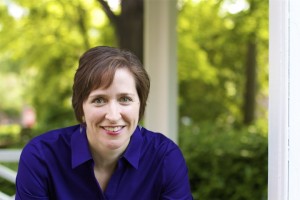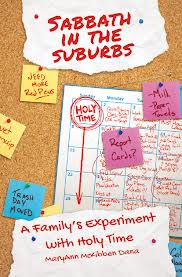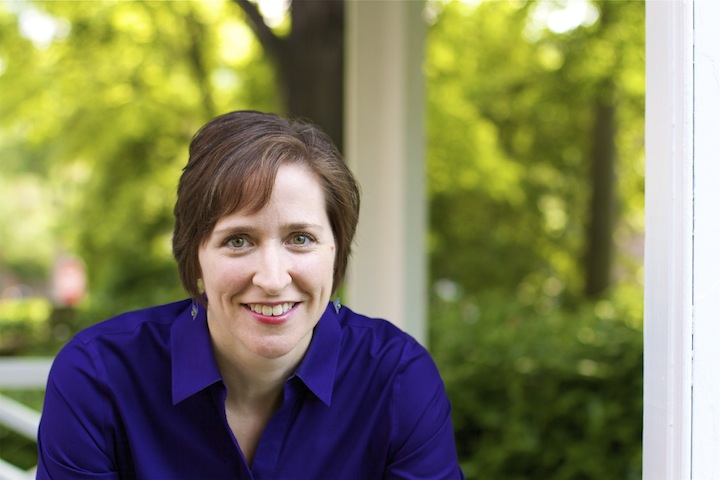Sabbath in the Suburbs: A Conversation with MaryAnn McKibben Dana
 Editor’s note: Our subject this week is MaryAnn McKibben Dana’s book, Sabbath in the Suburbs: A Family’s Experiment with Holy Time (Chalice Press, 2012). Here, some of our conversation on some of the issues raised in the book.
Editor’s note: Our subject this week is MaryAnn McKibben Dana’s book, Sabbath in the Suburbs: A Family’s Experiment with Holy Time (Chalice Press, 2012). Here, some of our conversation on some of the issues raised in the book.
You quote E.B.White at the beginning of the book on the struggle between improving and enjoying the world. How have you made peace with this struggle, or have you?
I love this question, because I love the E.B. White quote! Here it is, for those who aren’t familiar with it:
“If the world were merely seductive, that would be easy. If it were merely challenging, that would be no problem. But I arise in the morning torn between a desire to improve the world and a desire to enjoy the world. This makes it hard to plan the day.”
There’s a perception that Sabbath is a selfish pursuit, and that spirituality in general is self-indulgent. I share that perception, to some extent… or at least, I understand how our culture can take gifts such as Sabbath, prayer, retreat, solitude, and worship, and twist them into sentimental escapism. The E.B. White quote illustrates this tension. At its best, though, Sabbath draws us more faithfully into the world. It connects us with the God who is Creator of all that is, and who desires the wholeness—the shalom—of this creation. And Sabbath gives us energy and vitality for the work to which we have been called.
That said, I have come to a peace with this tension, because I no longer see it as a struggle. A new beloved quote has taken its place in my consciousness, by Howard Thurman:
“Don’t ask yourself what the world needs. Ask yourself what makes you come alive, and go do that. Because what the world needs is people who have come alive.”
I imagine a conversation between these two men, in which Thurman says, “But Mr. White… enjoying the world does improve the world.” Certainly in every life, every vocation, there are grueling moments and thankless, unpleasant tasks. And there are seasons when the drudgery overpowers the bliss. But we know we’ve found our heart’s work when we feel that coming alive… when there’s not a dichotomy between enjoying and improving the world. They are two sides of the same coin.
 I love it that you started thinking through this on pilgrimage at Iona, a lovely and wonderful place. I wondered what role getting away from home would play in Sabbath-making but it appears infrequently in the book. What say you about family travel and Sabbath?
I love it that you started thinking through this on pilgrimage at Iona, a lovely and wonderful place. I wondered what role getting away from home would play in Sabbath-making but it appears infrequently in the book. What say you about family travel and Sabbath?
Robert and I actually took a trip with the kids to Iona this past summer! It felt like a bookend to the Sabbath experience, bringing them back to the place where we discovered our yearning for a more gentle pace to our lives. I was nervous about the trip because it’s such a different environment than home, and so different from the places where we usually travel. We didn’t know how our kids (ages 10, 7 and 5) were going to cope with several days on this tiny island with no Internet, no TV, etc. They were wonderful. There’s plenty of stuff to do there, but more to the point, they “got” the place. I found it interesting that they could walk all over the island without much complaint, whereas they complained their way through the streets of Dublin, where we also spent a few days. I’d expected the city to have lots of interesting things to hold their attention, but no—they got tired and cranky much more easily there. That was an important learning for me. Travel provides that perspective, and I believe, can build on the groundwork of a regular Sabbath discipline.
And just as some Sabbath days are full of activity and others are more restful, even lazy, our vacations can also vary between go-go sightseeing and relaxed, unscheduled trips. And just like on Sabbath, you have to negotiate different people’s preferences and needs.
I probably didn’t talk about travel very much in the book because I was already aware of how wrapped up Sabbath is in issues of privilege. Leisure time is easier to come by for the wealthy than for the poor. When you add issues of travel, the differences become even more stark. Our trip to Iona was a splurge and a stretch, but would have been completely out of the realm of possibility for many, many people. I don’t have a good answer for that. I did talk a little about “staycations” in the book. Staycations often grow out of economic realities, but there’s something to be said for vacationing in place. It’s like a multi-day Sabbath, and I love staycations.
Tomorrow: McKibben addresses families living with someone who is ill or has special needs, and how to keep Sabbath when economic pressures make taking a full day very difficult or impossible.


privilege. Leisure time – the wealth of households – this is an issue (these are) and barely more than two years into retirement (jubilee after seven periods of seven years of educated work) stares us in the face. How ironic to view life as a struggle and a challenge for all those decades leading up to age 69 (and looking forward). Sabbath is more of a choice in “Third Life” but nevertheless still a choice, much more difficult from some (will not mention names) than for others. Be still and know.